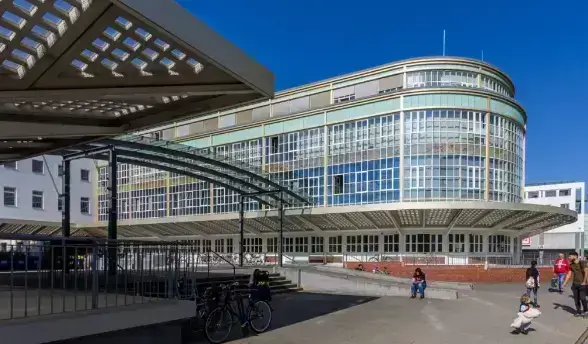Step into the future of manufacturing with fabrikanlage, a cutting-edge technology revolutionizing production processes across industries. Imagine a world where efficiency meets innovation, where precision and speed go hand in hand to create superior products. Fabrikan is not just a solution; it’s a game-changer reshaping the way we think about manufacturing. In this article, we will explore how Fabrikan is transforming the manufacturing landscape, its key benefits, and why it stands out as the future of production.
What is fabrikanlage?
fabrikanlage, a term derived from the German words for factory and system, represents the next generation of manufacturing technology. It integrates advanced automation, robotics, and AI-driven systems to create highly efficient and adaptable production lines. This state-of-the-art technology is designed to streamline operations, reduce costs, and enhance product quality, making it a pivotal tool for modern manufacturers.
Key Features of fabrikanlage
1. Advanced Automation
Fabrikan leverages cutting-edge automation to perform complex tasks with minimal human intervention. From assembly lines to quality control, automated systems ensure precision and consistency, reducing the risk of errors and increasing productivity.
2. AI-Driven Decision Making
Artificial intelligence is crucial in Fabrikan, enabling real-time data analysis and decision-making. AI algorithms can predict maintenance needs, optimize production schedules, and adapt to changes in demand, ensuring that the manufacturing process is always running at peak efficiency.
3. Robotics Integration
Robotics is a cornerstone of Fabrikan, with robots handling tasks that are repetitive, hazardous, or require high precision. These robots work alongside human workers, enhancing their capabilities and creating a more efficient and safe working environment.
4. Flexibility and Scalability
Fabrikan systems are designed to be highly flexible and scalable, allowing manufacturers to quickly adapt to new products or changes in production volume. This adaptability is crucial in today’s fast-paced market, where the ability to pivot and innovate can make or break a company.
5. Enhanced Quality Control
With fabrikanlage, quality control is integrated into every step of the manufacturing process. Advanced sensors and real-time monitoring systems ensure that any defects are detected and corrected immediately, resulting in higher-quality products and less waste.
Benefits of Implementing fabrikanlage
1. Increased Efficiency
By automating routine tasks and optimizing production processes, Fabrikan significantly increases efficiency. This leads to faster production times, reduced labor costs, and higher output, giving manufacturers a competitive edge.
2. Cost Savings
The initial investment in Fabrikan technology is offset by the long-term savings it provides. Reduced downtime, lower labor costs, and minimal waste all contribute to substantial cost savings over time.
3. Improved Product Quality
Consistent quality control ensures that every product meets the highest standards. This not only reduces the number of defective products but also enhances customer satisfaction and brand reputation.
4. Enhanced Safety
By automating dangerous or repetitive tasks, Fabrikan reduces the risk of workplace injuries. Robots can handle hazardous materials and operate in environments that are unsafe for humans, creating a safer workplace overall.
5. Environmental Sustainability
Fabrikan promotes sustainability by reducing waste and optimizing resource use. Efficient production processes and real-time monitoring help minimize energy consumption and material waste, making manufacturing more environmentally friendly.
Why fabrikanlage is a Game-Changer
Fabrikan stands out as a transformative technology due to its ability to integrate seamlessly with existing systems while providing unparalleled improvements in efficiency, quality, and flexibility. It represents a shift from traditional manufacturing methods to a more dynamic, data-driven approach that is better suited to the demands of the modern market.
Challenges and Considerations
1. Initial Investment
The upfront cost of implementing Fabrikan can be significant. However, the long-term benefits often outweigh the initial expenditure, making it a worthwhile investment for forward-thinking manufacturers.
2. Training and Adaptation
Adopting Fabrikan requires training for existing staff and potentially hiring new talent with expertise in automation and AI. Ensuring a smooth transition and integration into current workflows is essential for maximizing the benefits of this technology.
3. Cybersecurity
As with any technology that relies on data and connectivity, cybersecurity is a critical consideration. Protecting sensitive information and maintaining the integrity of production systems is paramount.
Conclusion
fabrikanlage is revolutionizing the manufacturing industry, offering unprecedented levels of efficiency, quality, and adaptability. By embracing this advanced technology, manufacturers can not only improve their production processes but also gain a significant competitive advantage in a rapidly evolving market. The future of manufacturing is here, and it is defined by the innovative capabilities of it.
FAQ’s
- What industries can benefit from fabrikanlage?
It is versatile and can be applied across various industries, including automotive, electronics, pharmaceuticals, and consumer goods. Any industry that relies on efficient, high-quality production processes can benefit from this technology.
- How does fabrikanlage improve product quality?
Fabrikan enhances product quality through integrated quality control measures that monitor and adjust the production process in real-time. This ensures that any defects are detected and corrected immediately, resulting in superior products.
- Is Fabrikan suitable for small businesses?
While the initial investment may be higher, small businesses can benefit from the increased efficiency and cost savings that Fabrikan offers. Additionally, scalable solutions are available to fit the needs and budgets of smaller operations.
- What are the environmental benefits of Fabrikan?
Fabrikan promotes sustainability by optimizing resource use, reducing waste, and minimizing energy consumption. These efficiencies contribute to a lower environmental footprint for manufacturing operations.
- What training is required to implement Fabrikan?
Implementing Fabrikan requires training for existing staff to operate and maintain the new systems. Additionally, hiring or consulting with automation experts and AI can help ensure a smooth transition and maximize the technology’s benefits.
